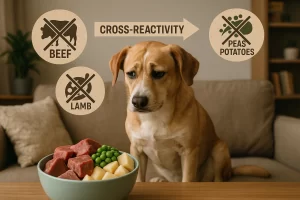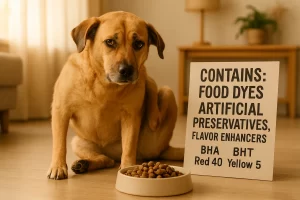When it comes to food allergies in dogs, identifying hidden proteins can be a challenging yet essential task. Hidden proteins often cause allergic reactions because they are not immediately recognizable in the ingredient list. In this article, we’ll explore how to identify these hidden proteins in dog foods and how to protect your dog from potentially harmful reactions.
What Are Hidden Proteins in Dog Food?
Hidden proteins are ingredients in dog food that contain animal or plant-based proteins but are not labeled clearly as such. These proteins can cause allergic reactions in dogs, even though they might not appear in the food’s main protein list. Often, these proteins are disguised under names such as by-products, hydrolyzed proteins, or meat meals, which makes them harder to detect.
Common Sources of Hidden Proteins in Dog Food
Some ingredients in dog food are not what they seem. These “hidden” sources of protein can be harmful to dogs with food allergies. Here are a few common sources of hidden proteins:
1. Meat By-Products
Meat by-products are leftover parts of the animal that are not typically considered a main protein source. They may contain small amounts of protein that are not easily identified. For example, poultry by-products may include feathers or beaks, but they still contain protein that could cause allergic reactions.
2. Hydrolyzed Proteins
Hydrolyzed proteins are proteins that have been broken down into smaller parts to make them less likely to cause an allergic reaction. However, some dogs may still react to hydrolyzed proteins, especially if they’ve been exposed to them in the past.
3. Meat Meals
Meat meal is made from ground-up animal parts, including bones, organs, and muscles. While it’s a concentrated source of protein, it often doesn’t specify the exact animal source, making it difficult for pet owners to identify potential allergens.
4. Animal Fats
Animal fats are often used in dog food to enhance flavor. They are derived from various animals, and because the fat is processed, it may not always be clear which animal it came from. For dogs with specific protein allergies, even animal fat can trigger an allergic reaction.
5. Plant-Based Proteins
In addition to animal-based proteins, some plant-based proteins are often hidden in pet foods. Soy, peas, and lentils are common ingredients that contain protein but may not always be listed as “protein” on the ingredient label.
How to Identify Hidden Proteins in Dog Food
To protect your dog from allergic reactions caused by hidden proteins, it’s important to scrutinize dog food labels carefully. Here’s how you can identify these hidden proteins:
1. Look for Ingredients with “By-Products”
Ingredients labeled as “by-products” or “meat by-products” are often harder to trace, but they contain hidden proteins. Be cautious when you see terms like “poultry by-products” or “animal by-products” on the label, as these can include allergens.
2. Check for Hydrolyzed Proteins
While hydrolyzed proteins are often marketed as being easier on dogs with allergies, they may still contain allergens. If your dog has a known sensitivity to certain proteins, it’s best to avoid foods with hydrolyzed proteins or consult your vet before feeding these products.
3. Examine Meat Meal Sources
“Meat meal” can come from any animal, making it hard to determine which protein your dog might be allergic to. If your dog has a known allergy to a particular animal protein, try to find foods that list specific animal sources, like “chicken meal” or “beef meal,” rather than generic terms like “meat meal.”
4. Watch Out for “Animal Fats”
Animal fats in dog food may be derived from several different animals. If your dog is allergic to specific animal proteins, it’s important to be cautious with foods that contain “animal fat” without specifying the source.
5. Look for Plant-Based Proteins
If your dog has a plant-based allergy, be sure to check for ingredients like soy, peas, lentils, and corn. These ingredients often contain protein but may not be labeled as such, and they can trigger allergic reactions in sensitive dogs.
What to Do If Your Dog Has an Allergy to Hidden Proteins
If you suspect your dog is reacting to hidden proteins in their food, here are the steps you should take:
1. Consult Your Veterinarian
Your veterinarian is your best resource for identifying allergies. They may recommend an elimination diet or perform tests to pinpoint the specific proteins your dog is allergic to.
2. Switch to a Limited Ingredient Diet
A limited ingredient diet contains fewer protein sources, which makes it easier to identify and eliminate specific allergens. Look for foods with a single protein source, such as duck, turkey, or venison, which are less likely to contain hidden proteins.
3. Carefully Read Dog Food Labels
When selecting a new food, always check the ingredient list carefully. Avoid any foods that contain ambiguous terms like “meat by-products,” “animal fat,” or “hydrolyzed proteins.” Opt for transparent brands that list specific protein sources and ingredients.
The Role of Allergy Testing in Identifying Hidden Proteins
If you’re struggling to find the source of your dog’s allergies, allergy testing can provide valuable insight. Your veterinarian may recommend blood tests or skin tests to identify which specific proteins are triggering the allergic reactions. This can help you make more informed decisions about your dog’s diet.
Conclusion: Keeping Your Dog Safe from Hidden Proteins
Identifying hidden proteins in dog food is crucial for managing food allergies and ensuring your dog’s health. By carefully reading food labels, working with your vet, and choosing limited ingredient diets, you can help protect your dog from allergic reactions caused by these hidden proteins. Always prioritize transparency in ingredients, and never hesitate to seek professional advice when making changes to your dog’s diet.



